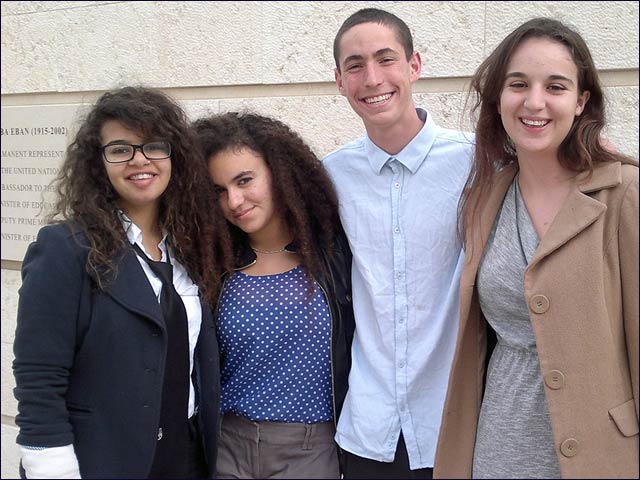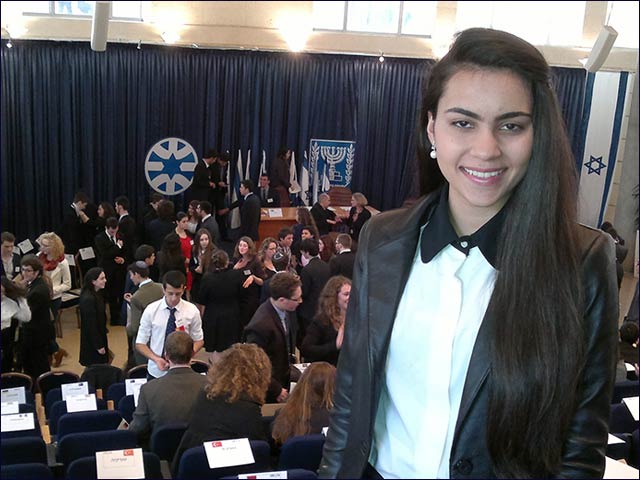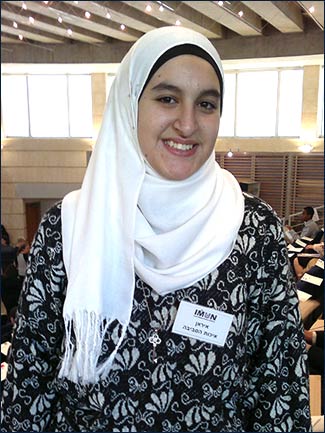By Avigayil Kadesh
High school boys in suits and ties, girls in dresses and heels, milled about excitedly on the plaza outside Israel’s Ministry of Foreign Affairs on the afternoon of January 27, 2013 – opening day for an unusual session of Israel Model United Nations (IMUN).
Inside the ministry’s auditorium, dignitaries including Foreign Ministry Deputy Director General Pini Avivi and Jerusalem Mayor Nir Barkat pumped up these 200-plus delegates from high schools across the city for two intense days of deliberations.
Bearing name tags identifying the countries and committees they represented, the 15- to 17-year-olds from 14 religious, secular and Arab high schools were also encouraged by Israel’s UN Ambassador Ron Prosor, who spoke live from “the frozen Big Apple” at the Israeli Consulate in New York City. Simulated debate, Prosor told them, could well prepare them for representing Israel as real statesmen someday.
“We hope this will open their eyes to the big world out there,” says adviser Samara Wacks, an English teacher at the Hebrew University High School (Leyada) and an active Model UN participant since her youth. She is also involved in
IsraMUN, an international academic MUN in Israel founded in 2009.
The kids who volunteered to participate were divided according to country and assigned to committees dealing with issues such as human rights, disarmament, chemical warfare, environment and abortion. Over three months of preparation and rehearsals, they received Foreign Ministry staff briefings and did their own research to formulate proposed laws to solve problems according to their country’s viewpoint.
“They don’t have to agree with their country’s position, but they have to get ‘into the shoes’ of their country, and we hope it makes them more tolerant,” says Wacks. “We also hope it will make them appreciate the idea of service to one’s country.”
Public-speaking skills
Keshet High School student Eliya Kaplansky, 16, says she enjoys representing South Korea’s views on weaponry though they differ with hers. “They believe that manufacturing small arms is their right, but I don’t look at it the same way.”
Roi Zeldin, 16, of Mae Boyer High School, represented France. “I learned about their policy on abortion [fully reimbursable, on demand up to 12 weeks] and I’d like to have the same policy here in Israel, too,” he says.

Shahar Adjami, Ella Moshe, Roi Zeldin and Hadas Binyamin
were part of Boyer High School’s delegation. Some of the students from the Arab-Israeli Beit Tzafafa High School were representing Iran.
“The rules in Iran are taken from the Koran, and I’m Muslim so I agree with their rules,” says Aseel Saadi. “Religion can stop human beings from doing [bad] things.”

Aseel Saadi from Beit Tzafafa High SchoolShe adds, however, that she joined IMUN mainly to take advantage of its many benefits. “It strengthens my Hebrew language skills and makes me more confident to speak without hesitation in front of hundreds of people.”
Her classmate Rahaf Alfaad agrees. “I very much enjoy Model UN. It helps me to learn new things. It makes my Hebrew language stronger, and I can make friendships here with new people. It’s good to talk with people from Jewish high schools. We would all like to have peace, and if we don’t talk to each other we won’t have peace.”

Says Rahaf Alfaad: “We would all like to have peace,
and if we don’t talk to each other we won’t have peace.” Vote, veto, discuss and debate
Wacks explains that the Jerusalem gathering was not recognized officially by the International MUN because discussions were held in Hebrew rather than English, the organization’s required language.
“We are doing it this way so we can include kids from high schools in areas that are not high socio-economically and might not be proficient in English. The purpose of this group is to try to integrate all the different spheres in the city: Arab, Orthodox [Jewish], secular and pluralistic.”
After opening day, the group held sessions at Hebrew University for two days, from 8am till 7pm. They all got to vote, veto, discuss and debate.
“I like politics, so I decided to join,” says Eli Brown, a 16-year-old Leyada student. “Each school got a few countries to represent, and we got Togo, China and Norway. I picked Togo because they told me it was the hardest.” When he Googled “togo,” he got the site for the Israeli shoe store chain To Go. “It was a challenging experience to get information, and it was a nice opportunity to learn about countries in Africa.”
Shahar Adjami, a Boyer student, says participating in IMUN “improved my skills in public speaking and how to listen and react to others. It makes you feel mature, and gives you a lot of tools you can use afterward to express yourself.”
Daniel Meron, bureau head of the Foreign Ministry’s United Nations & International Organizations Division, says the ministry offers its expertise and support to the Jerusalem IMUN because “we like to see a young generation that is interested in the greater world, with an understanding of Israel’s position and all that Israel has to offer to the world.”
He adds that there are IMUN groups also for college-age students, and that this year, an Israeli will be chosen as a delegate to the International MUN at UN headquarters in New York.